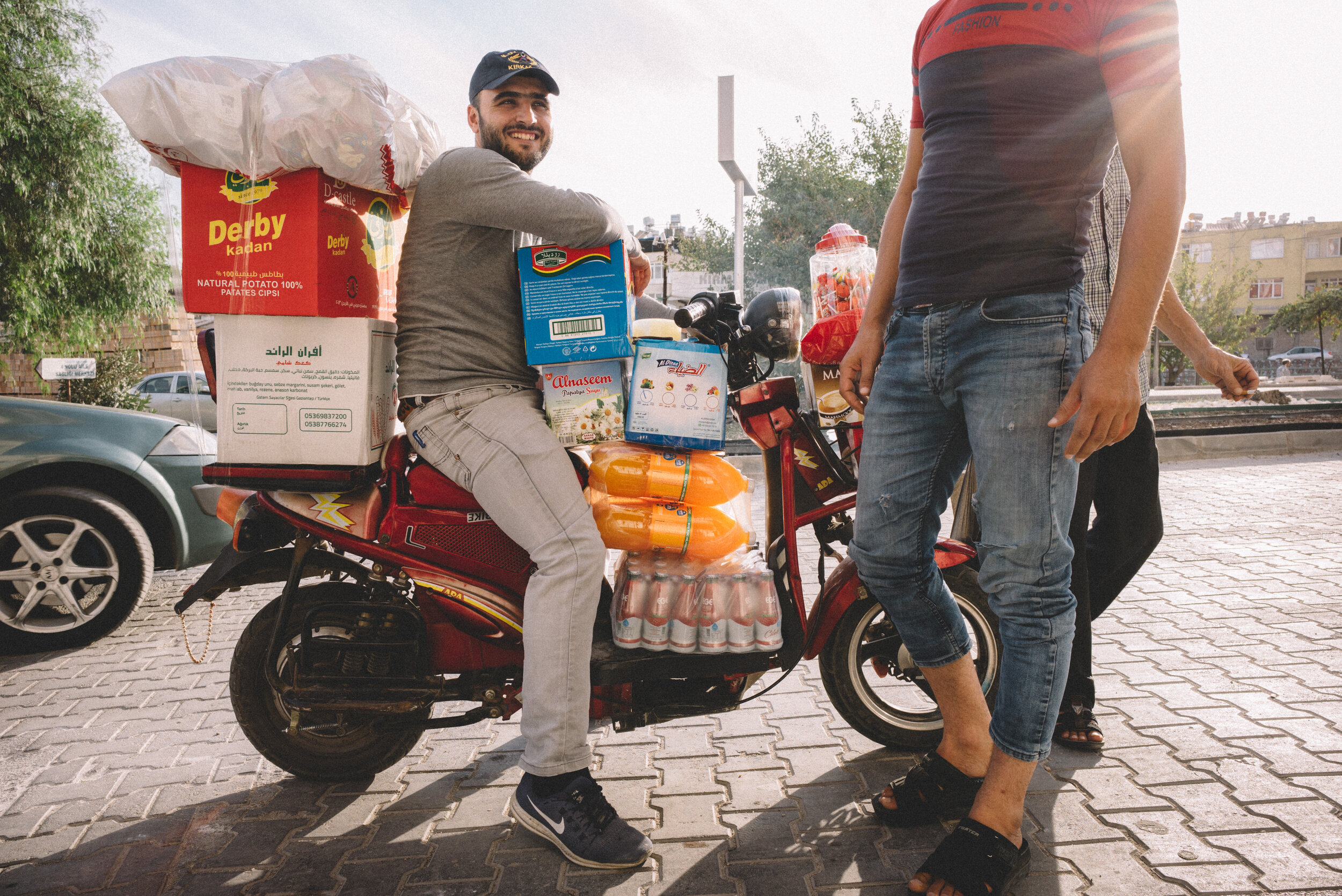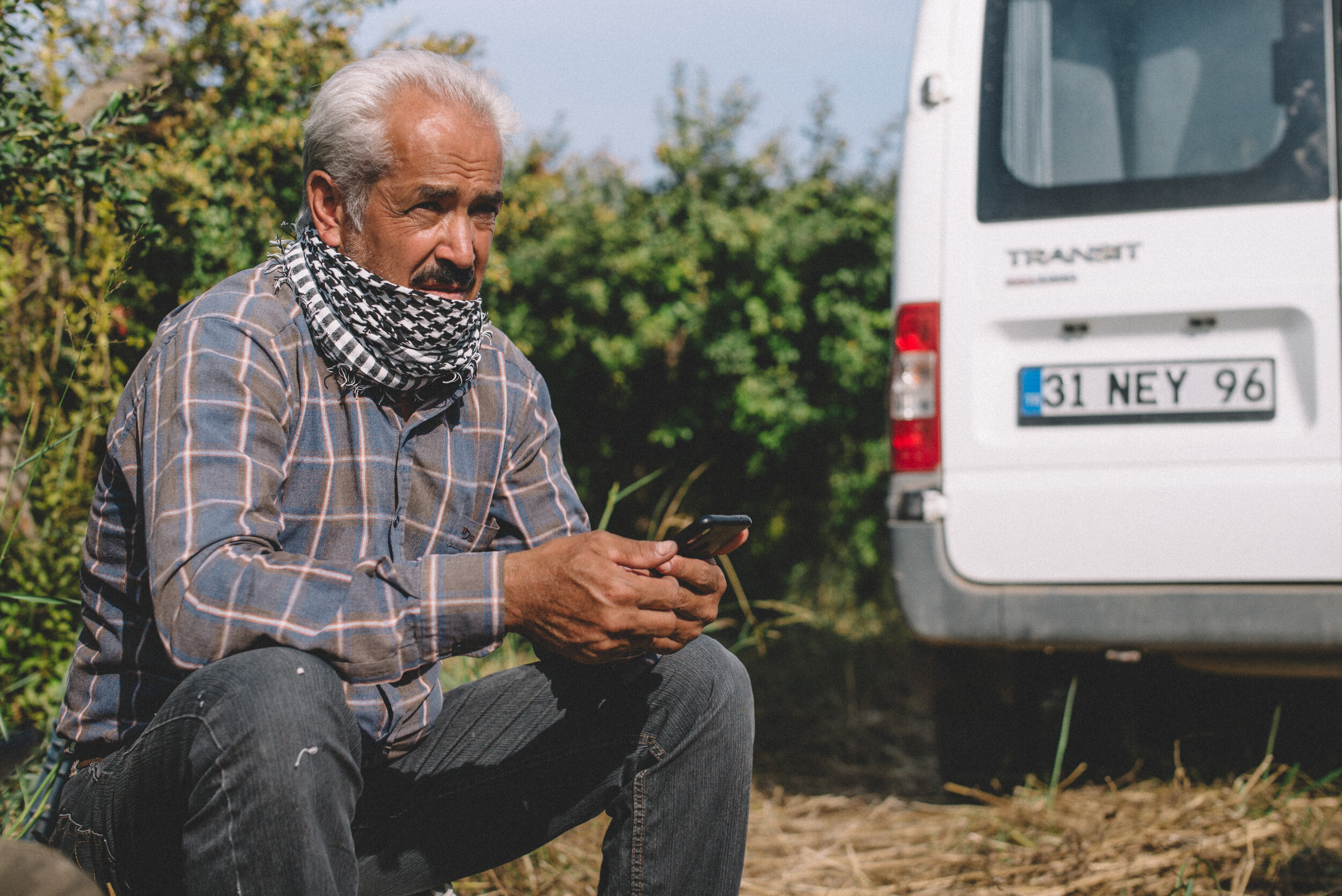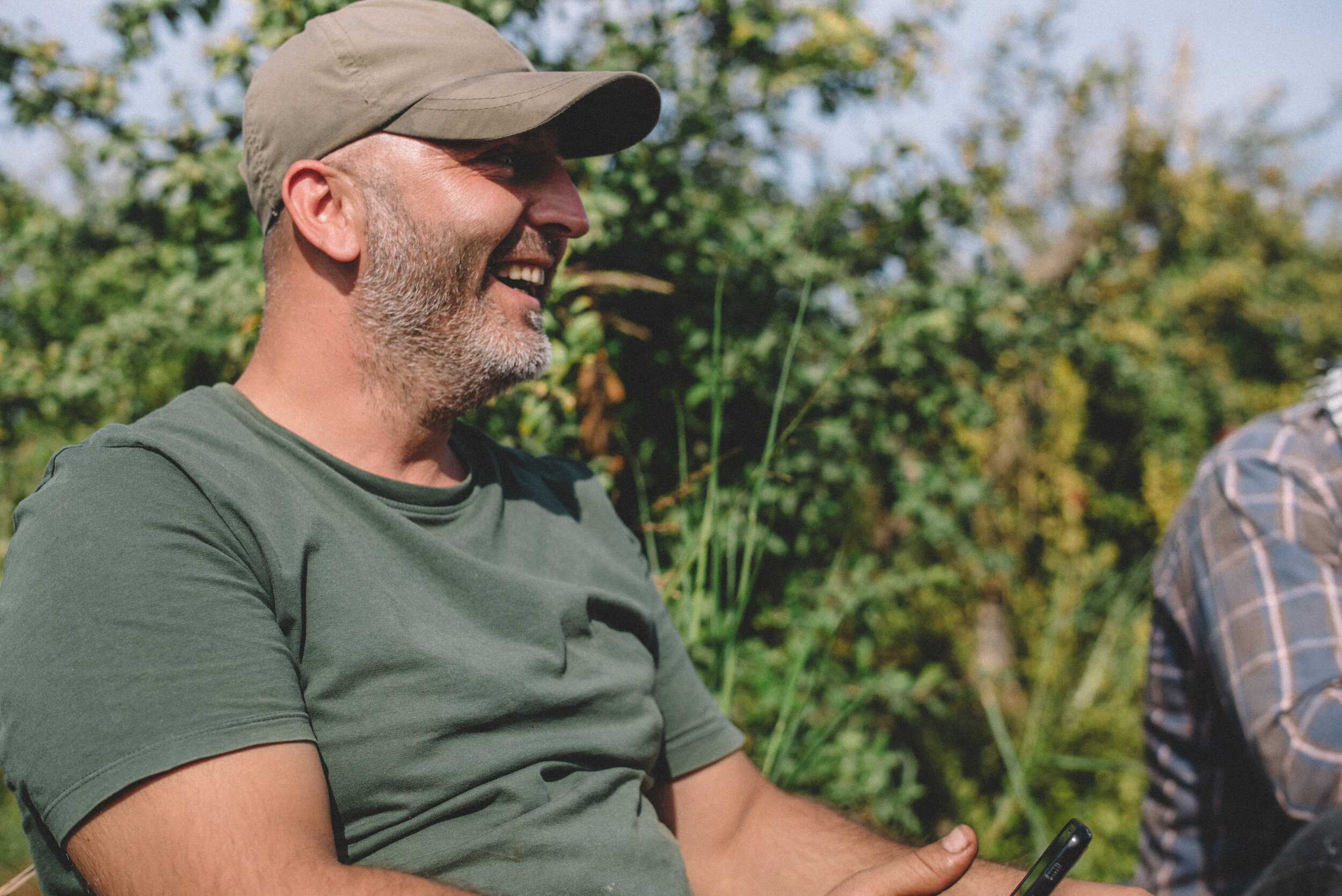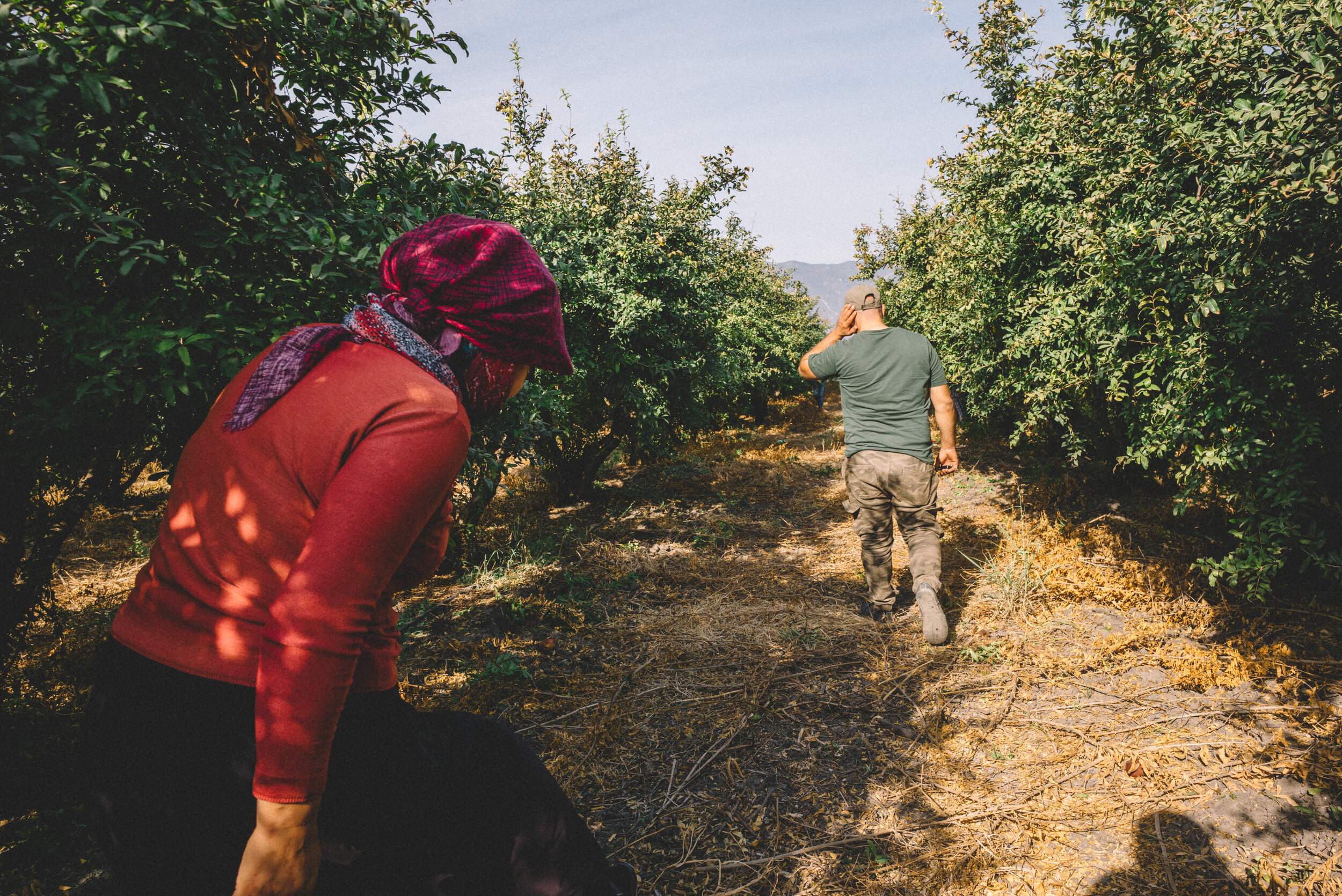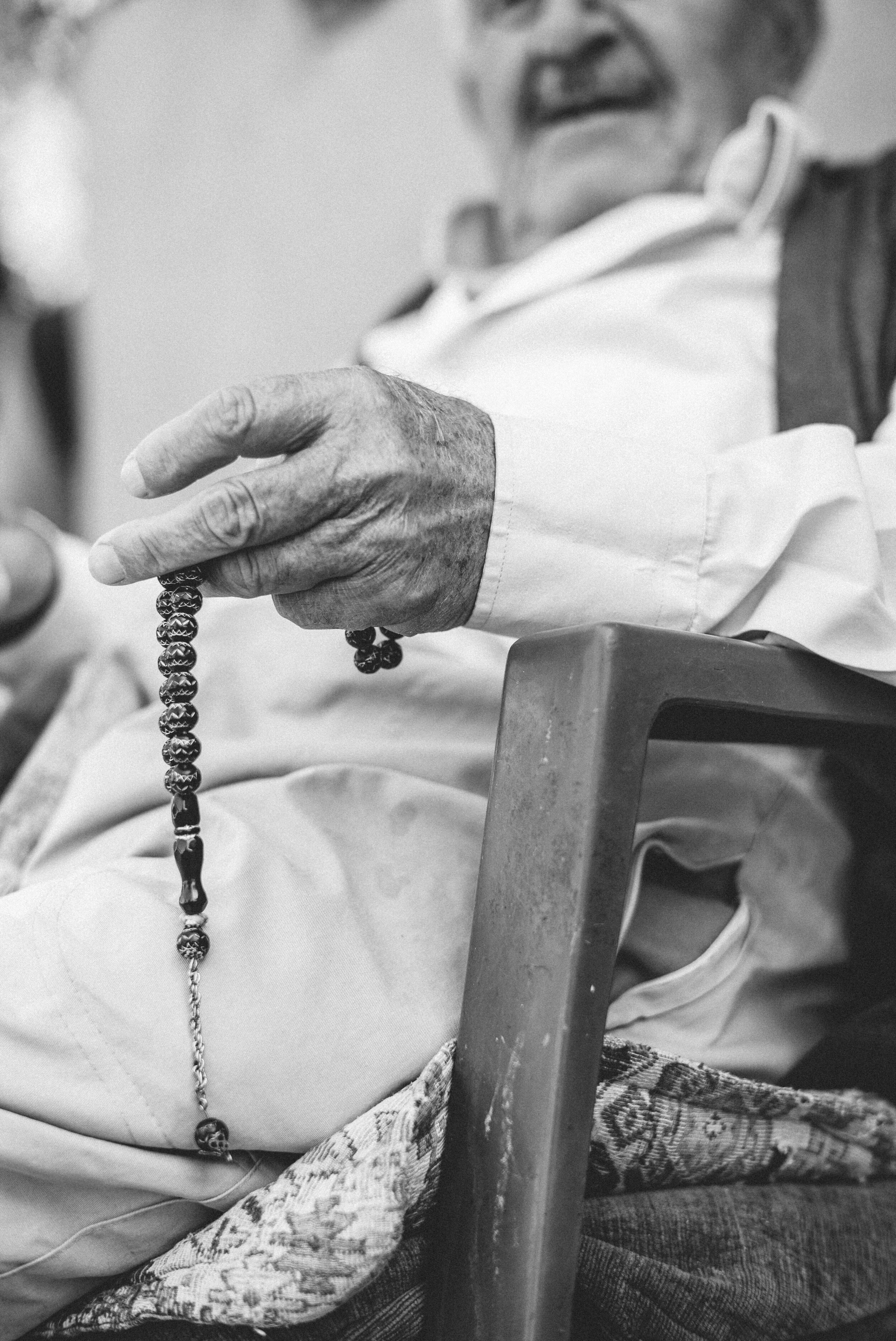A quick note from what we’ve dubbed ‘A Truckers’ Hotel’, 24 October 2020.
Stopovers: every decent road trip needs them. We’ve been spending a fair amount of time in the car for this trip, more than Daniel and I would have assumed and hoped before, but it is also true that Kirikhan would have been much harder to reach, in terms of distance and terrain, without a vehicle. What’s most obvious, furthermore, is that once we reach the city we can do whatever it is that has become our modus operandi everywhere. That is to say: Daniel and I stroll, we wave at non-suspecting passers-by, we peek around corners, we nibble at food we don’t know (or just straight-up empty up bags of crisps). And then - we’ve learned by now to hold onto confidence - often, either our own courageous is warmed up, or chance rears its head.
First: more about Kirikhan. The city centre is busy, the main thoroughfare seems permanently clogged. My eye is drawn to an enormous Armenian flag that hang been hung from one sidewalk to another. It is like a jumble of eateries, lodgings, slightly dilapidated commercial centers and junk shops.
Eventually, we find our Ibrahims - plural, and all Syrians, in a single urban area of the city. We are taken from a kebab shop to a supermarkado, and from a barber’s to a women’s clothes boutique. Shadi is baffled now, by what’s almost like an Ibrahim-conveyor belt of shy kids and grinning rampageous friend groups. Ibrahim el-Hassan (10), Ibrahim el-Hassan (4) and Ibrahim Moustafa (5) are all from the Hama district in Syria. I am thoroughly entertained by a run-up of visiting school friends and cousins in Moustafa’s father as we try to interview the young Ibrahim pair in a shop filled with trinkets. An uncle brings by a surprise: in his hands he holds a small plastic bag that is filled with water. Five or six little millionfish swim around the pouch, with the shop’s bright fluorescent light bouncing off of their tiny rainbow scales.
Shadi, Daniel and I spend our evening in a road-side hotel that seems to simultaneously serve long-distance lorry drivers and wedding parties. I think that is quite fitting, having picked up that Kirikhan means “broken inn” in Turkish. The three of us stretch out on a queen’s size bed to watch a Netflix movieAn insect screen has been placed around the balcony; its netting blurs the view of the dusty national roads that lead out of Turkey. In the morning we find out that the view is a lot better from the top-level breakfast room. Double doors lead to a rooftop terrace that has been designed like an Italian piazza of papier-maché. Such romance we find in our last stretch of the road!
Driving on: 25 October 2020, towards Kilis
Since Daniel and I have now given into the notion that we may need a car to get around on this reporting trip, we have also grudgingly accepted that we will be driving to Kilis. The distance between those two cities is about one hundred kilometers, and the road runs along much of the Turkish-Syrian border. As anti-terrorism operations appear to be on-going in these borderlands, walking has become ill-advised.
We set one condition: on this day’s drive we will try to get out of the car as much as possible, even to stretch the legs. We try to outline a route that will take us along small settlements, like Ceylani and Çamsari.
We’ve left the hotel early in the morning, on a day that is shaping up nicely for a drive. With Shadi behind the wheel we scale our first forested hills. The pine branches almost brush the top of the car. The three of us dig into a bag of sunflower seeds, turning down the windows every so often to spit or throw out the shells. The mountain range gives us a wonderful view of the area - but we quickly realise that this scenic route won’t bring us to people. We grudgingly agree to descend again, down to more rural environments.
Then, we go from sunflower seeds to pomegranates as we make Shadi park alongside a group of men enjoying a road-side breakfast. They turn out to be a business family, brothers and partners in the fruit growing industry. “You’re looking at all our fields”, the elder son, Erjan, tells me underhandedly. There is pride in his voice - I can’t blame him, gaping at the hectares of land around us, which he indicates with his arms wide. Erjan is a big guy - close to being as tall as Daniel, and broad. He used to be in the Turkish army, he says, but working lands (or honestly, having others do it for him), fits him better now.
Erjan drives a big car, too, the kind you have to sort of scrabble into to get to the seat. It’s the picking season - we’re welcome to come watch. We tail it into the orchards, and find… an Ibrahim. He is 17-year old and introduces himself as Kalic. He only recently started this job.
Daniel' s fieldnotes: a peppered welcome, 25 October 2020
“We’re walking part of the Abraham Path sir. It’s a peace path leading us through the Middle East. Showing us the friendliness and hospitality in countries. We wanted to see it ourselves as the news tells us mostly about conflict.” It’s an explanation we know by heart. We have to, as we’ve been saying it quite often during this journey. Confused faces stare back at us Still we have to get into the police-car that will bring us to the station; we’ll have to clarify our quest at headquarters.
Lisa and I are walking the Abrahams Path. A 3500 km hike, starting in Ur Iraq, crossing Turkey, Syria, Israel, Palestine and Jordan to end up in the Sinai desert in Egypt. It’s a peace-path following the footsteps of the patriarch of all major religions in the region; Abraham.
As the full length at once is a bit much for a region that is known for conflict, we’ve decided to do it in ‘short’ 350 km stages. Trying to cover as much as we can on foot, we don’t shy away from a ride if necessary or when offered. We didn’t expect it to be unavoidable as much though. Specially during our second stage in Southern Turkey. As the end of our walk here is nearing, it’s safe to say that walking along the Syrian border turned out harder than we anticipated. In the past three and a half weeks it has been six times that we ended up in a police station. Each time the blue Jandarma four-wheel drives stopped us in our treks. We tried to clarify our business as best and honest as we could, but never was our excuse satisfactory. Resulting in a bumpy ride in the back of the car.
With only a few days left, we figured we should change tactics. We had been traveling the last week and a half with Shadi. A professional fixer and translator in both Turkish and Arab. Perfect for our meetings with Syrian refugees, Turkish hoteliers and the many people we met along our way. Including the police. He also brought a car with him. At first we still tried to walk longer distances, but that still got us in trouble. Apparently the area we tried to visit was invested with potential crooks and terrorists. Our stays at the police stations shortened because of good translation, but they kept reoccurring never the less. Time to take the car and just drive to the villages we wanted to visit and roam around there for a bit.
Leaving the car next to a little supermarket just outside a hamlet not far from the border, we instantly became the talk of town. Customers popping out to see what is going on and people showing up out of no where to inspect us strangers surfacing in their small village. Some people wearing mouth guards, some have them but decided to leave them down as sort of a chin rest. Others don’t seem to bother at all. We buy some water and get permission to leave the car while taking a little walk. A young lad in scrappy cloths arrives on his loud motorbike. He stops in front of us, stares and turns the bike around to ride off again. By the time we enter the little settlement, he has passed us several times. I try to take a photo but he’s too quick and gracefully disappears around the corner. Out of sight.
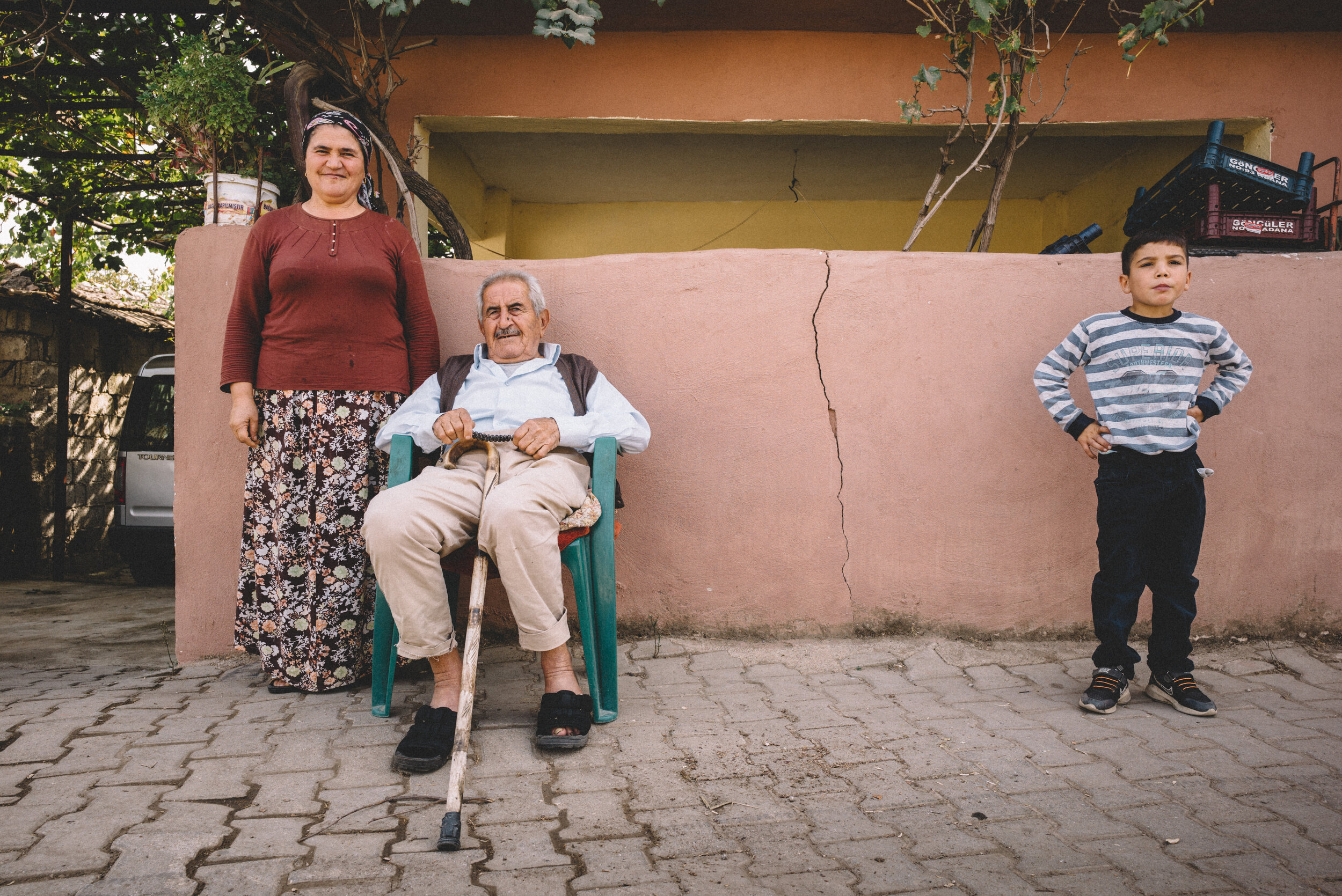
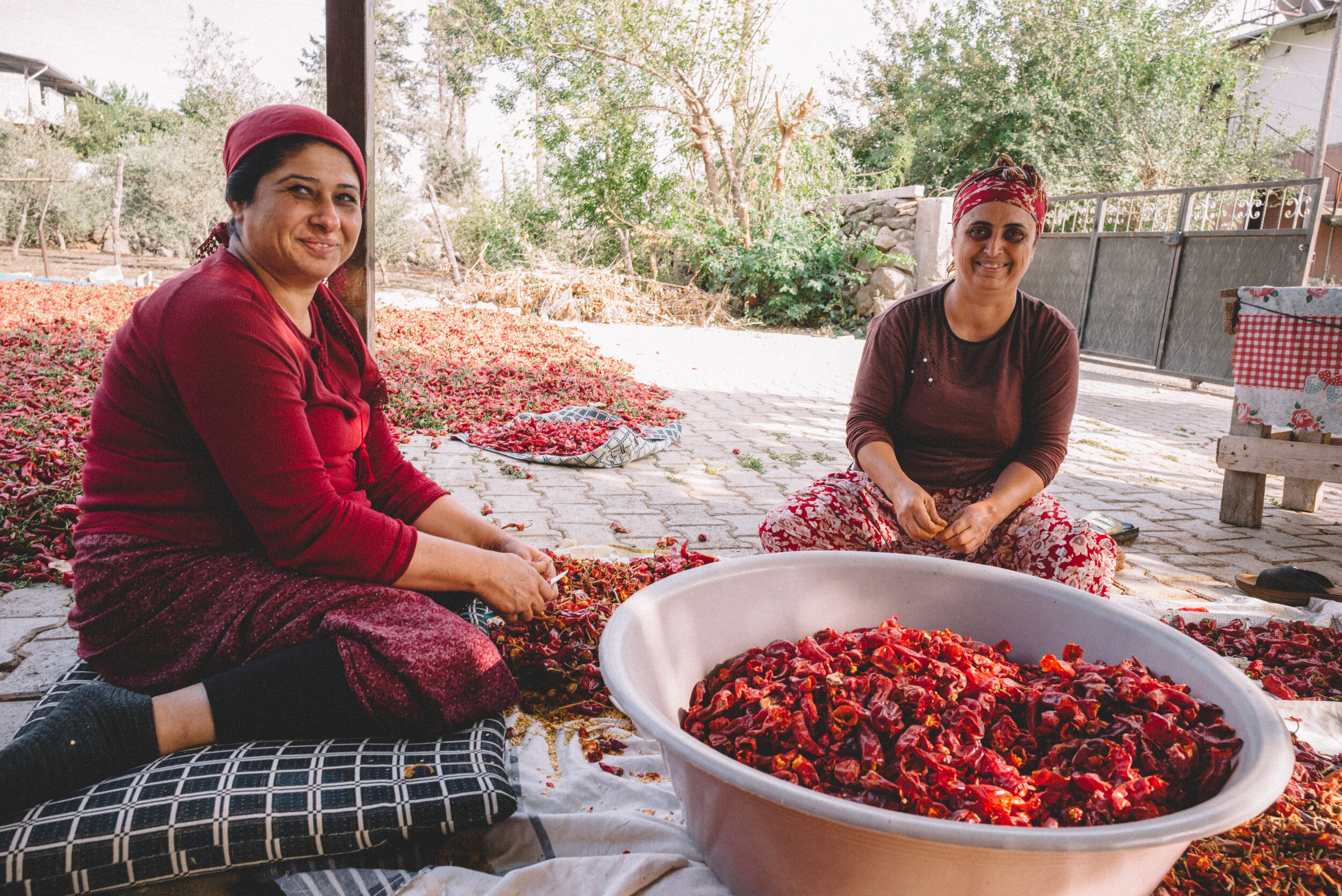
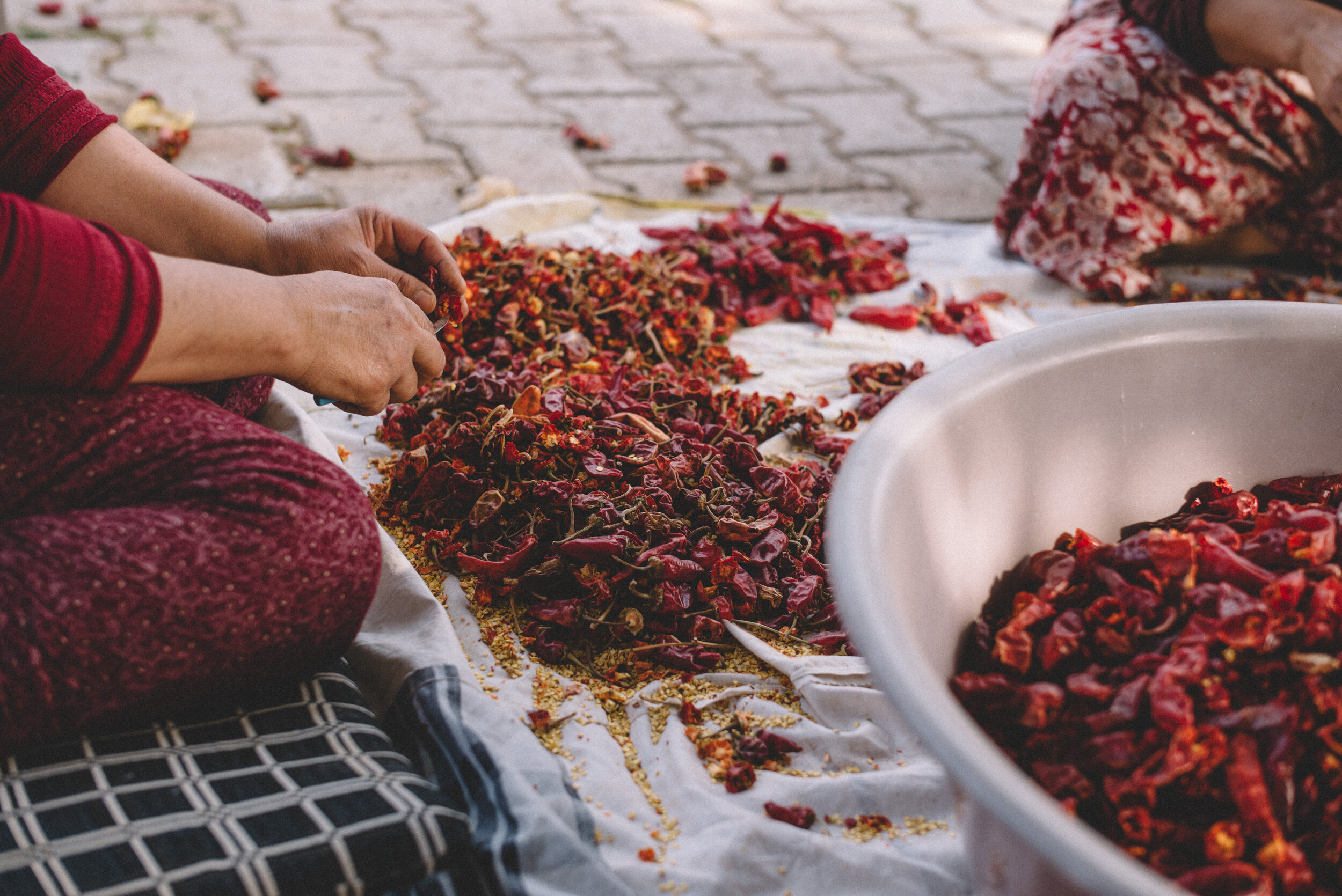
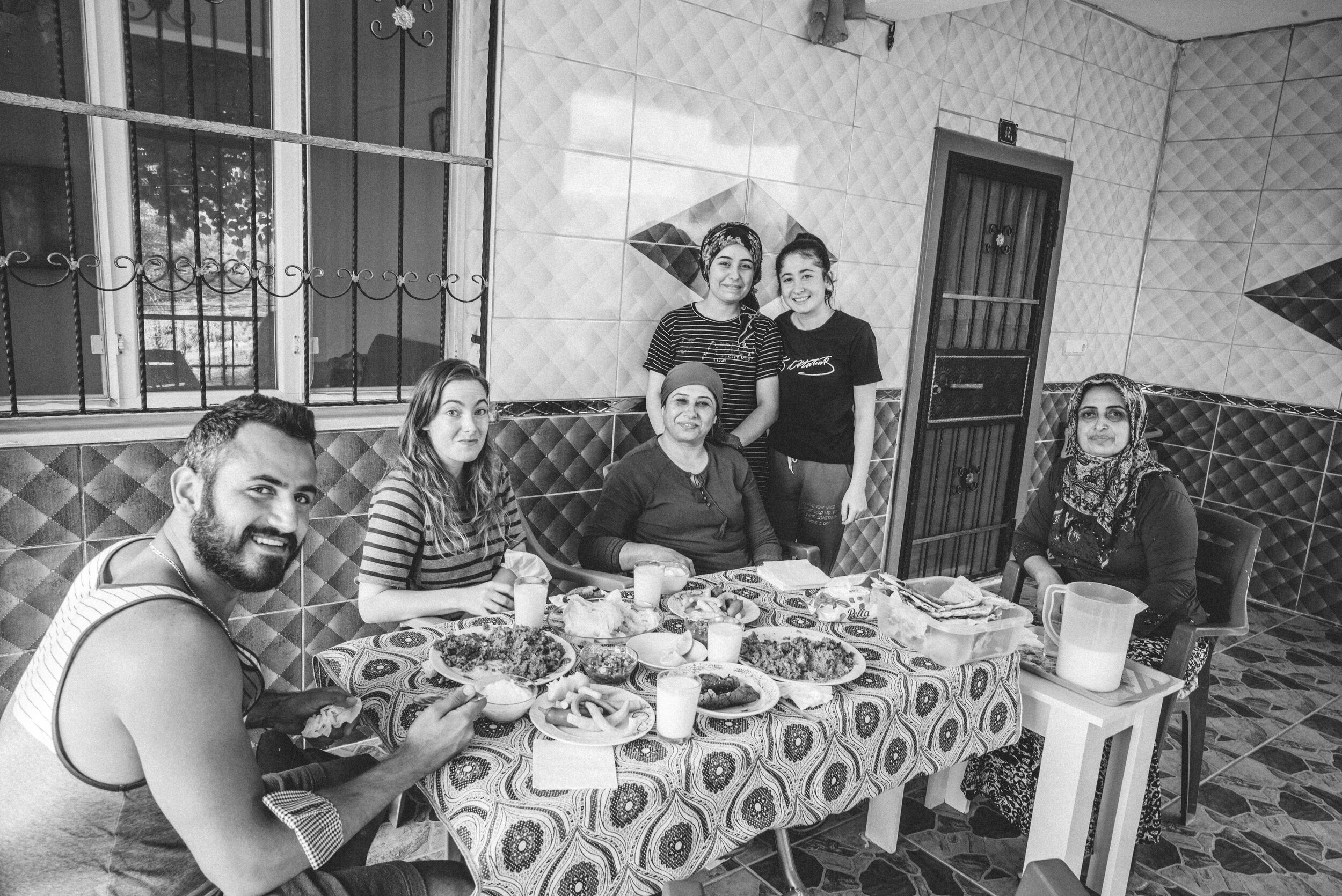
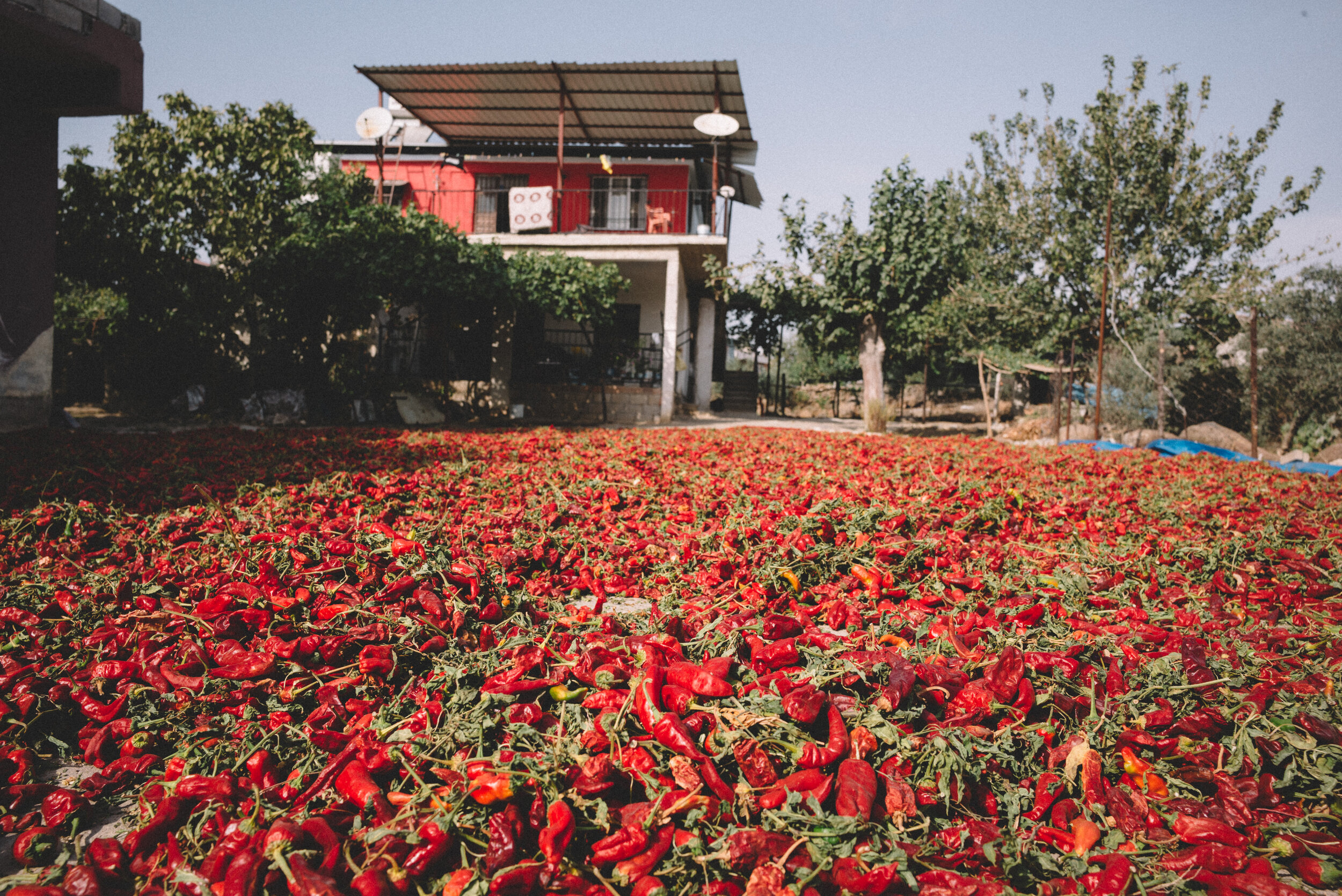
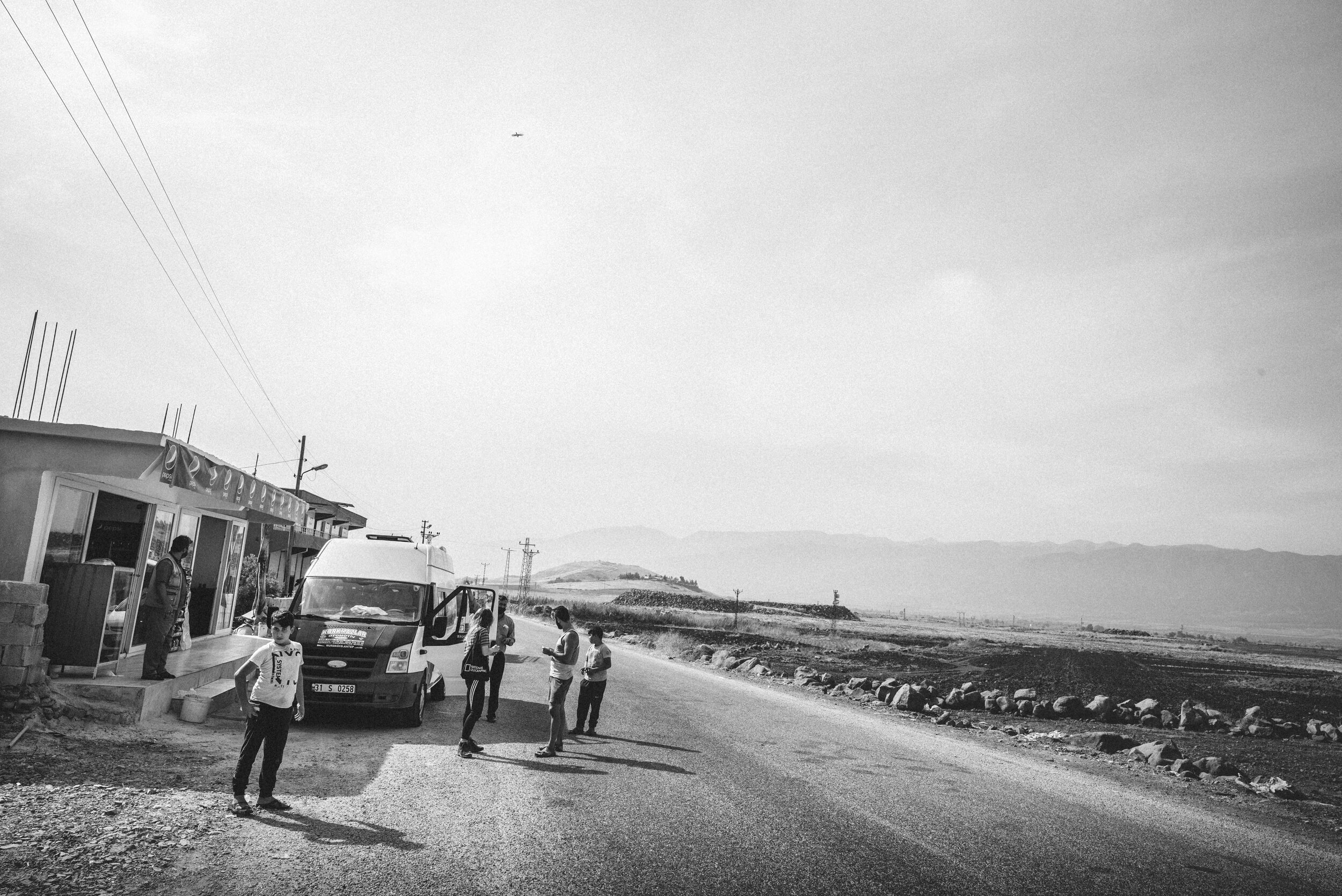
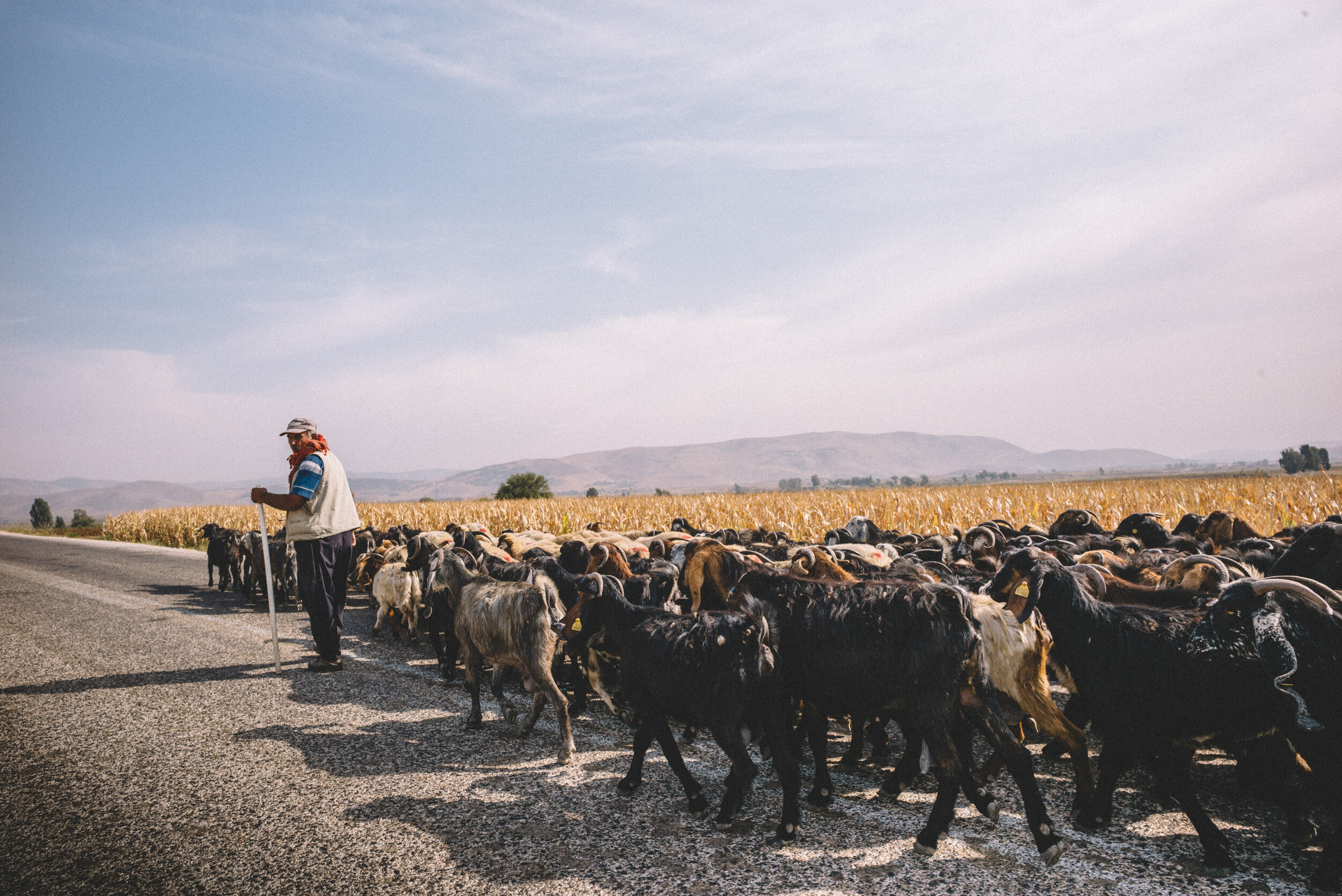
As we are not trekking nor have a clear goal of where we are going, I can’t resist peeking into a little courtyard we pass. The gate is left open just enough to stick my head through. A little patio, filled with a tapestry of red peppers drying in the sun. Two ladies sitting on the ground at one of the corners. A tarpaulin providing shade, the two women are having a laugh while cleaning and sorting the peppers. It’s only when I stick my head a bit further into the yard - trying to capture the two having fun - they notice me. Friendly laughter and curious looks are exchanged and I’m invited in. I call out to Lisa and Shady and we enter the scene. Aware of possible guard dogs to spoil this interesting encounter, we proceed slowly and carefully. The ladies stay put, but two younger girls come out of the house joining them.”Rojbaş!”, one of them calls out to us. It tells us we’re in a Kurdish community. The friendly ‘hello’ makes us feel welcome instantly. They make fun of us, each other and the situation. It is decided we need to stay for lunch.
A small table is set on the porch next to the house. While the young girls run in and out bringing food from the house, Lisa is questioned by the ladies; “My son is not here, but he would make a great husband for you.” A cheeky smile my way to see wether we are an item or not. My poker face isn’t giving away anything. I realise the dynamics would have been different if the men of the house hadn’t been out for work. I doubt we would have had a full table and I’m pretty sure these ladies wouldn’t have been this forward.
With a full table in front of us, I ask about the food. “Nearly all of the food is prepared with biber salçası”, one of the ladies proudly explains, pointing to the drying peppers. I’m loving it. They keep serving, even when I’m starting to doubt wether I can walk back to the car or if I should take a nap first. My appetite is obviously received as a complement for their cooking skills. When it’s time to go, they offer me a 5 liter jar of red sauce. Biber salçasi isn’t Kurdish for pepper, as I misunderstood. It turns out to be a dark paste made of the dried fruits, mixed with oil and salt. I have no idea how I’m going to take this home with me, but as this is one of our final walks anyway, I decide to gratefully accept this generous present.
Back in the car, we are ready to continue our journey to Killis, endstation of this episode of our project. We make a u-turn, planing to head for the highway. Stop. Jandarma. Again. They have been called for strange activity in the neighbourhood. We show our passports and try to convey our intentions, but we know where this is going. Lisa and I are directed to the police-car and Shadi follows in his, joined by one of the officers. By now we are used to it. At least our stomachs are full when we sit down in the courtyard of our seventh precinct, waiting for another commander to come out and hear our story.







